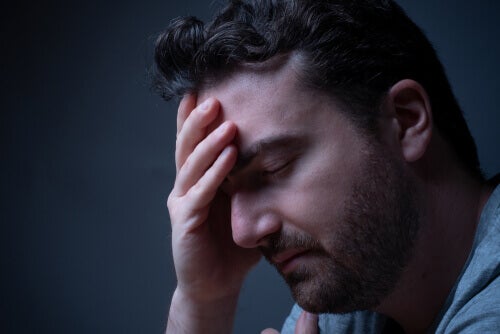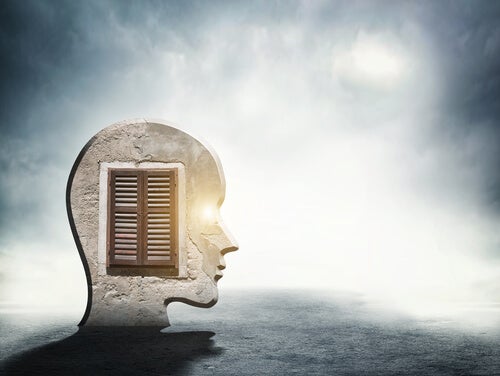Feelings of Guilt and Their Connection to Anxiety


Written and verified by the psychologist Valeria Sabater
Feelings of guilt are a fairly common symptom of anxiety. Those who suffer from this condition draw quite harmful conclusions about themselves. They carry a burden on their shoulders that they aren’t responsible for. They also distort situations, which makes them suffer even more.
“I’m making things even worse”, “I’m sure I’ve hurt them due to my behavior”, or “I’m letting my family down”, “My mother became sick because of me” are just some examples. However, most of these statements follow a similar line.
The person in question is a victim of a type of tunnel vision that their anxiety is completely controlling. They often take the anxiety disorder or panic attacks as a sign that they’ve done something wrong, as an anomaly that’s beyond their control. They start to despair and wonder how they can cause themselves so much suffering and what’s wrong with them.
Self-blame, and the feeling that you’re disappointing or hurting those close to you, end up feeding the vicious cycle of anxiety. If we also add factors such as being overly self-demanding or engaging in obsessive thinking, it’s a time bomb for your mental health.
Let’s try to better understand these situations.

Feelings of guilt
There’s logical or illogical (irrational) guilt:
- The former is linked to specific facts that justify the resulting suffering and guilty conscience. These will come as a result of causing real suffering to other people or being responsible for actions that had serious consequences.
- The latter, irrational guilt, is caused by anxiety and even other types of psychological disorders.
In the case of feelings of guilt linked to anxiety, it’s very common for them to arise in people who are always beating themselves up for doing or feeling certain things. They even feel guilty about thinking them.
The simple fact of being aware of a negative mental bias or of having a mind that sometimes lives in fear or uncertainty causes the shadow of guilt to emerge.
They see that they can’t control it and that their behavior makes those around them worry. All this simply further intensifies this uncomfortable and destructive feeling.
Feelings of guilt and shame in anxiety
Research that was recently published in the magazine PLOS ONE and conducted at the Karolinska Institute in Sweden states that anxiety disorders are often related to feelings of guilt and shame.
It’s obvious that these are two different types of feelings. However, they’re both expressed under a common trigger. What trigger? The inability to be able to control feelings and the subsequent discomfort this produces.
Guilt implies that you feel bad about something that you’ve done, said, or experienced. Shame, on the other hand, is more harmful in people with anxiety or other types of disorders. It means that you feel bad about who you are as a person. Also, it arises when you underestimate or undermine yourself and, at the same time, blame oneself for practically anything that happens.

How can you manage the emotions associated with anxiety?
The best method for calming, untangling, and placating feelings of guilt or shame is to focus on the trigger that intensifies and shapes them: anxiety itself.
In these situations, cognitive-behavioral therapy (CBT) or even acceptance and commitment therapy are useful and effective.
Some useful advice
Nevertheless, it’s always useful to know how to handle complex emotions such as guilt. Let’s have a closer look at some tips that could help you:
- You feel guilt when you make a moral judgment about your behaviors, feelings, or thoughts. You assume that there’s something wrong with you. In this case, you must be clear about one thing: anxiety isn’t a defect. It’s a psychological condition that you can and should handle. In fact, if you commit yourself to dealing with it, you’ll see positive changes.
- You need to stop judging yourself. If you punish yourself with these constant feelings of guilt, your anxiety will worsen. It’s time to treat yourself with kindness. Because of this, factors such as strengthening your self-esteem and gaining self-confidence and assertiveness could really help you.
- Guilt feeds on worry. The more you feed your worries, the bigger those obsessive and often illogical thoughts will become. You need to silence those negative thoughts and focus your mind on other tasks and more rewarding activities.
In conclusion, make every effort to free yourself from the burdens that feed the anxious thoughts in your mind.
Feelings of guilt are a fairly common symptom of anxiety. Those who suffer from this condition draw quite harmful conclusions about themselves. They carry a burden on their shoulders that they aren’t responsible for. They also distort situations, which makes them suffer even more.
“I’m making things even worse”, “I’m sure I’ve hurt them due to my behavior”, or “I’m letting my family down”, “My mother became sick because of me” are just some examples. However, most of these statements follow a similar line.
The person in question is a victim of a type of tunnel vision that their anxiety is completely controlling. They often take the anxiety disorder or panic attacks as a sign that they’ve done something wrong, as an anomaly that’s beyond their control. They start to despair and wonder how they can cause themselves so much suffering and what’s wrong with them.
Self-blame, and the feeling that you’re disappointing or hurting those close to you, end up feeding the vicious cycle of anxiety. If we also add factors such as being overly self-demanding or engaging in obsessive thinking, it’s a time bomb for your mental health.
Let’s try to better understand these situations.

Feelings of guilt
There’s logical or illogical (irrational) guilt:
- The former is linked to specific facts that justify the resulting suffering and guilty conscience. These will come as a result of causing real suffering to other people or being responsible for actions that had serious consequences.
- The latter, irrational guilt, is caused by anxiety and even other types of psychological disorders.
In the case of feelings of guilt linked to anxiety, it’s very common for them to arise in people who are always beating themselves up for doing or feeling certain things. They even feel guilty about thinking them.
The simple fact of being aware of a negative mental bias or of having a mind that sometimes lives in fear or uncertainty causes the shadow of guilt to emerge.
They see that they can’t control it and that their behavior makes those around them worry. All this simply further intensifies this uncomfortable and destructive feeling.
Feelings of guilt and shame in anxiety
Research that was recently published in the magazine PLOS ONE and conducted at the Karolinska Institute in Sweden states that anxiety disorders are often related to feelings of guilt and shame.
It’s obvious that these are two different types of feelings. However, they’re both expressed under a common trigger. What trigger? The inability to be able to control feelings and the subsequent discomfort this produces.
Guilt implies that you feel bad about something that you’ve done, said, or experienced. Shame, on the other hand, is more harmful in people with anxiety or other types of disorders. It means that you feel bad about who you are as a person. Also, it arises when you underestimate or undermine yourself and, at the same time, blame oneself for practically anything that happens.

How can you manage the emotions associated with anxiety?
The best method for calming, untangling, and placating feelings of guilt or shame is to focus on the trigger that intensifies and shapes them: anxiety itself.
In these situations, cognitive-behavioral therapy (CBT) or even acceptance and commitment therapy are useful and effective.
Some useful advice
Nevertheless, it’s always useful to know how to handle complex emotions such as guilt. Let’s have a closer look at some tips that could help you:
- You feel guilt when you make a moral judgment about your behaviors, feelings, or thoughts. You assume that there’s something wrong with you. In this case, you must be clear about one thing: anxiety isn’t a defect. It’s a psychological condition that you can and should handle. In fact, if you commit yourself to dealing with it, you’ll see positive changes.
- You need to stop judging yourself. If you punish yourself with these constant feelings of guilt, your anxiety will worsen. It’s time to treat yourself with kindness. Because of this, factors such as strengthening your self-esteem and gaining self-confidence and assertiveness could really help you.
- Guilt feeds on worry. The more you feed your worries, the bigger those obsessive and often illogical thoughts will become. You need to silence those negative thoughts and focus your mind on other tasks and more rewarding activities.
In conclusion, make every effort to free yourself from the burdens that feed the anxious thoughts in your mind.
All cited sources were thoroughly reviewed by our team to ensure their quality, reliability, currency, and validity. The bibliography of this article was considered reliable and of academic or scientific accuracy.
- Hiedman Eric (2013) Shame and Guilt in Social Anxiety Disorder: Effects of Cognitive Behavior Therapy and Association with Social Anxiety and Depressive Symptoms. PLoS One. 2013; 8(4): e61713. 2013 Apr 19. doi: 10.1371/journal.pone.0061713
This text is provided for informational purposes only and does not replace consultation with a professional. If in doubt, consult your specialist.







